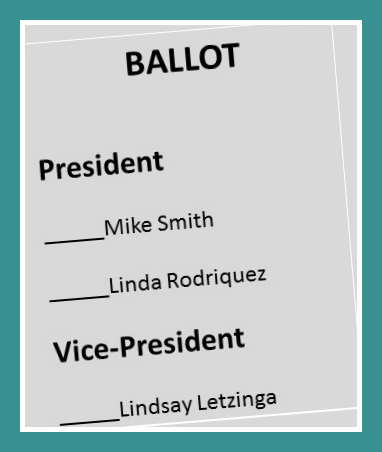Nonprofit Board Development Trains, Equips Community Leaders
Last Updated: September 30, 2024
Is your local community organization struggling? That's not surprising if your nonprofit board development is lacking.
Such training sessions for your neighborhood organization and community leaders should be a regular occurrence. Although no doubt you have recruited board members who are passionate about your cause, board members bear certain financial, legal, and supervisory responsibilities also, and sometimes they are unprepared for these.
Whether you have actually formed a not-for-profit corporation and applied for IRS tax-exempt status or not, this page is equally relevant. Almost every community or neighborhood organization could use a more thoughtful, informed board and more skillful leadership.
Planning Your Nonprofit Board Development Event

Your nonprofit board development series could take the form of weekly or bi-weekly special meetings, but often the most successful events pack the information and skill building exercises into one or two exhausting days.
The advantages of the retreat model include greater likelihood of unanimous attendance and the sense of team building that occurs as a result of going through an intense experience together in a short period of time. But if your board resists a full day or days devoted to this activity, accept the format that most people agree to attend.
I had a dreadful personal experience with a board retreat that was broken up into two evenings, without the same people attending each night. However, if you cannot spare a day, you may be able to work in an hour-long segment at each board meeting with some degree of satisfaction. Thoughtfully prepared modules certainly would be better than nothing.
You will need to choose a facilitator for the training event. In most cities you can find a well-respected volunteer leader, extension agent, or university professor who is skilled as a facilitator. If not, consider someone from a neighboring town who might fit one of those descriptions. Ideally you do not want to have to pay a facilitator, but your own finances will dictate how you approach this subject. Mainly you want a person who understands the roles and responsibilities of nonprofit boards thoroughly and who is able to draw out your more reticent members and accommodate differing viewpoints.
Be clear with the facilitator about your goals for the event. Are you solely trying to teach board members about their roles? Or do you have a team building purpose as well? Or do you hope to use the meeting as a way of helping new and old board members become acquainted with each other? A clear answer to those questions will help you choose and prepare the right facilitator, as well as possibly prevent disappointment in your own ranks when the outcomes of the training event are not what someone expects.
If possible, we suggest finding a place for your training that is other than your usual meeting place. Somehow going to a different venue shakes up our typical interaction patterns and may help people see one another in a different light. This suggestion becomes more important if your usual meeting site will be noisy or lacking in privacy during the times when you expect to conduct the board development.
Content of A Neighborhood Board Development Retreat
We begin our discussion of the content of your board development event with the topic that some of your board members dread the most. Learning how to fundraise and the responsibility of board members to contribute money themselves or see that there are sufficient funds should be emphasized. As part of this discussion, the facilitator, possibly with the assistance of an organization's executive director or treasurer, needs to explain the organization's financial picture and how to read and ask questions about the financial statements that are presented to the board.
The facilitator must be careful to bracket for future consideration the financial issues that are raised, but not relevant to developing board member skills. If the nonprofit board development retreat turns into problem solving for items of business that should have been discussed in regular board meetings, you will have defeated your purpose. This holds true for the entire event, of course, but it is especially likely that finance discussions derail the board development purpose.
Here's our choice of what should be included in a board development process aimed at quality neighborhood leadership:
- Helping participants identify and celebrate leadership skills and experiences they already have. Everyone who's ever been a parent has some leadership skills. Confidence building and debunking the myth that leadership is a secret set of highly specialized skills are important first steps.
- Understanding the dynamics of communities enough to identify the assets of the community, in line with the work of the Asset-Based Community Development Institute.
- Learning to conduct meetings, participate in meetings, and manage activities in a productive manner.
- Ensuring that board members have a solid understanding of the group's mission, vision, history, and current programs. While you are engaging with them on these topics, you might gain new insights about how or why your group's messaging is confusing.
- Understanding group dynamics and how to deal with difficult people, including domineering individuals.
- Managing the inevitable conflicts, including both systemic inter-group conflicts that will never go away, and the personal conflicts that can threaten the peacefulness of the group.
- Getting plans into action, or you might say DOING SOMETHING! This is a stumbling block for many if not most groups at some point. But a leader has to be able to inspire others to just try something if the path ahead is not clear. If we all jump off the cliff together, and choose a cliff that isn't too high, we can do this.
- Evaluating the results of the actions taken and programs presented.
- Communicating internally and with the outside world, and understanding the impact of both positive and negative neighborhood publicity on your work.
- Enhancing local government relationships whenever possible, and building partnerships with other likely and unlikely allies within the community that share the same goals, or have the potential to do so.
Then depending on the backgrounds of your board members, you may decide to add to the above soft skills by providing specific topical education in the substantive problems that your groups face. For instance, in a city, you may want to add professional training on the specific topics relevant to your neighborhood, which will lend board members credibility in the community.
If you are in a sophisticated organization or are attempting a complex project, you'll need to identify and address the specialized training that your own leadership and staff need.
Lastly, you may need to devote some time and energy to transitioning people from ordinary faithful board members to key officers. It isn't unusual at all for only three or four board members to be prepared to serve as the president, treasurer, and other important officers; eventually those who have been serving in those roles for a long time will become unavailable to your organization. People may lack confidence, experience, or merely the opportunity to step up. If you aim to upgrade the leadership skills of women, we suggest a good free resource, the Nonprofit Leadership Workbook for Women.
Why You Need to Train More Leaders
My experience as a frequent neighborhood participant and a consultant suggests that often a group could accomplish much more if more leaders were available to chair another fundraiser, organize a committee, serve as a block captain, or initiate newcomers into how to fight City Hall more regularly.
If leaders are well-liked, groups take a well-functioning board for
granted. But people change, households move, and leaders often burn out
or fall in love with a new interest. You need leaders for your geographic community waiting in the wings.
From that perspective, almost all of you need to be engaged in nonprofit board development of some type every few months.
As we talk with community organization founders and leaders in our own communities, and as we hear from you our web visitors, we are increasingly impressed (and depressed!) about how many of you are operating with vacancies on your board. That represents missed opportunities for additional types of representation.
Some of you may want to consider whether to include potential new leaders and board members who can think strategically, add professional expertise, or express the voices of youth or other under-represented populations, in your board training event. This can work well if you feel that team-building as a board has already been accomplished, and you do not need for the nonprofit board development retreat to serve as a way of cementing working relationships.
If there is a team-building agenda, though, you should plan to train future leadership at a different time and place so as not to disrupt the bonding experience. Elevating one or more members of the under-served group to leadership can bring your organization a broader perspective, wider involvement, and greater respect as a more politically potent organization.
This might apply to young people, minorities, newcomers, women, men, clients of your organization's services, immigrants, or whoever in your community is less likely to be active. But these new folks will need some training.
The book we recommend to the typical visitor to this site is Community Leadership Handbook: Framing Ideas, Building Relationships and Mobilizing Resources.
For a wealth of online resources on board development, you could start with material from the National Council of Nonprofits. They have added some great articles on attracting diversity into your board and also working to attract millennials.
In larger metropolitan areas you also will find one or more organizations dedicated to nonprofit training, and some universities offer these opportunities as well.
Nonprofit Board Development through Mentoring
A common method of developing new leaders is by giving them a minor leadership role, or a major one if you're desperate for a warm body, and giving them a little extra advice, support, and assistance along the way.
Often you can appeal to ego to persuade a person with experience on other boards to serve on yours. Often you can encourage them to volunteer for you if you stress the mentoring opportunities.
Mentoring is most effective if one of you has specifically volunteered for this duty and takes it seriously. Some people will need mentoring for a year or more, and others can draw on previous life experience to catch on in a month or two, depending on the difficulty of the task.
Look for opportunities to do this. Many boards struggle with how to include underrepresented groups without diluting their effectiveness.
Mentoring can be an answer; simply take the leap of faith, find a member of the under-represented community who is motivated to learn, and take a chance. Most neighborhood associations with a lively program have several new leadership roles available each year, so why not spread out the leadership and develop new options for yourself?
But this is important: Some tasks are more critical to your mission and survival than others, so don't appoint an untested person to do the annual fundraiser. But they might be great at representing you at a table at a citywide fair.
If you conscientiously develop new leaders even when you don't see an immediate need for them, two things will happen:
• When you need a leader on short notice, you'll have some good choices.
• When someone emerges as a leader, you may suddenly notice a new need that could be filled by a program requiring a good leader. Voila; you've added program without too much pain.
Evaluating External Leadership Development Programs
When leaders don't have time to mentor, the mentoring process doesn't seem to be doing the trick, or you want to take your game to the next level, you may decide you need to send someone, or several folks, to a formal training program.
Not all programs that purport to develop your board members actually deliver an up-tick in leadership skills. Too often, especially when the program is lecture-based, it serves merely as a refresher course for people who already are leaders.
In an urban area, you probably can find an appropriate leadership training course through a civic organization, United Way, or even a community college. Some rural areas will find that an extension service does a good job in this respect.
But in many locations, you have to either watch for particular events that would highlight some aspect of being a board member, or maybe send people to a three-day seminar out of town. Especially since the pandemic hit in 2020, there are an increasing number of attractive remote learning alternatives too for your consideration.
To evaluate a training program, ask these questions:
• Does the program include participatory experiences so that people learn by doing or through role play? (Note that this becomes more challenging when the training is delivered virtually, but still, "homework" exercises can accomplish much of the same benefit if skillfully designed.)
• Does the training emphasize sharing these experiential learnings?
• Was the program soundly developed as a cohesive whole, or is it merely a series of disjointed talks or lectures?
• Does the curriculum lend itself to neighborhood or community
work, or is it so business-oriented that your organization will see only
indirect benefits?
If you can find a great nonprofit board development program, gladly sponsor attendance by people in your neighborhood, and then give them important roles after they finish.
Try to find unlikely or inexperienced leaders who have some personality trait that makes you think they might be able to inspire others.
But avoid people who are so cranky or contentious that no one wants to be around them. Nonprofit board development courses aren't a substitute for therapy, and a strong but unpleasant person likely will still be a grouch after even the most sophisticated course.
How to Grow Your Own Nonprofit Board Development Program
An alternative to consider is banding together with other likely groups and finding the talent to put together a course or workshop series on the subject.
If you live in a rural area, you might think that's impossible, but if you consider your entire county or a couple of counties, you could probably find church groups, women's groups, farm groups, school boards, conservation boards, subdivision trustees, parent-teacher organizations, 4-H clubs, and a few individual businesspersons who would like to participate.
Turn to an extension service, college, or wherever you might find expertise to ask people to speak and lead.
An interesting option for you if you can't find teachers for your nonprofit board development program would be to study a book together, and rotate the leadership of the week's discussion and activities among the members.
If you're clear that there should be an activity, as well as talk-talk-talk, this could be quite a productive course. We recommend Smart Communities: How Citizens and Local Leaders Can Use Strategic Thinking to Build a Brighter Future by Suzanne W. Morse.
If you're in an urban area, call on business or outstanding community leaders, university professors of communications or urban studies, and any groups that give technical assistance to community groups, which might include an urban extension service or a center at a university.
Many universities and community colleges will offer courses or one-day workshops applicable to nonprofits and community organizing. In a large city at least one university will have a continuing education center for nonprofits.
Urban participants can be recruited through civic organizations, service clubs (a generic name for the Rotary Club, Lions Club, and so forth), articles in newspapers and local blogs, radio shows, notices sent to large organizations and networks, and mailings to neighborhood organizations.
A television station might want to talk about your leadership development program on a magazine format program, especially if you can convince them into being a co-sponsor. Talk to your public television management.
An advantage for your group in putting together the nonprofit board development series is that it might become a minor money-maker for you, as you charge a fee to other groups.
Read About More Topics Related to Nonprofit Board Functioning
- Making and Keeping a Good Community >
- Community Organizations > Nonprofit Board Development
Join GOOD COMMUNITY PLUS, which provides you monthly with short features or tips about timely topics for neighborhoods, towns and cities, community organizations, and rural or small town environments. Unsubscribe any time. Give it a try.




